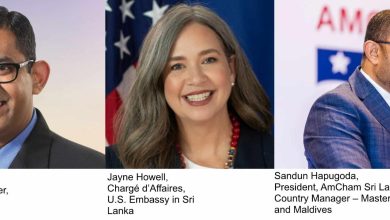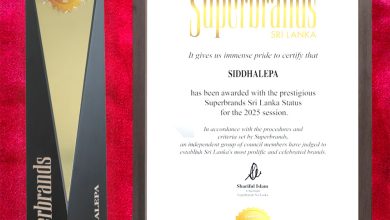BIODIVERSITY SRI LANKA
Biodiversity Sri Lanka’s Members take the lead at its Annual Technical Sessions – 2019
Altogether, over 30 private sector led environmental initiatives from over 20 organizations, more than 80% of which are BSL member companies, actively engaged with the conference. BSL’s efforts to feature private sector interventions were widely recognized as a landmark in the history of ATBC Conferences and the potential to build a platform for researchers, conservation practitioners and the private sector to formally link through scientific discourse, was created.
Increase in human population worldwide has exacerbated forest loss and fragmentation, particularly in the tropics, imposing considerable threats to the planet’s biodiversity. The urgent need to plan for the sustainable management and conservation of our biological wealth, could not therefore be overemphasized. In this backdrop, with the theme of “Bridging the elements of biodiversity conservation: Save, Study, Use” and with the participation of over 300 local and foreign participants, Biodiversity Sri Lanka held its annual technical sessions aligning with the Association for Tropical Biology and Conservation – Asia Pacific Chapter Conference, held from September, 10 to 13 at MAS Athena, Thulhiriya, Sri Lanka.

Biodiversity Sri Lanka (BSL), a National Platform established to promote engagement of the corporate sector in biodiversity and environmental conservation in the country, successfully conducted nine symposia on a diversity of topics, namely Indigenous Knowledge, Sustainable Agriculture, Conservation Partnerships, Plastics and Long-term Marine Pollution, Conserving Coastal Biodiversity, Sustaining Mangroves, Species Conservation, Green Tourism, Conservation Communications and Sustainable Banking, joining hands with its membership. Members drew on their experiences in each of the symposia themes interspersed with scientific presentations in line with the respective topics.
BSL’s Initiating Partner and Patron Member Dilmah Ceylon Tea Company’s conservation arm, Dilmah Conservation presented their distinctive portfolio of projects geared to conserve natural and cultural heritage in Sri Lanka. With their long term involvement in promoting the conservation of natural and cultural heritage as a successful model experiences in addressing the challenges of acquiring, collecting and building awareness on endangered traditional knowledge and supporting the protection of the “veddah and Ahikuntaka” two cultural minority groups existing in Sri Lanka were show cased. In addition, BSL’s Patron Member Jetwing Hotels’ initiative to introduce 19 traditional rice varieties in a 50 acre paddy land located at Kaduruketha was featured at this symposium.
The symposium titled Sustainable Agriculture: Utilizing Biodiversity and Ecosystem Services for Sustainable Development, at which four private sector led presentations were made, attracted a diversity of local and international participants. Dilmah Conservation’s pioneering work on the application of biochar was an eye-opener to the participants. Biochar carries a variety of short and long term benefits including improving water holding capacities and soil microbial activities in soil, nutrient retention and capturing and storing of carbon. BSL’s General Member Elpitiya Plantations presented their overall sustainability framework which has been aligned with the Sustainable Development Goals with very ambitious targets. Thalawakelle Plantations delivered the company’s integrated approach to biodiversity conservation which focuses on generating positive co-benefits for production, biodiversity and the local community. The Palm Oil Industry Association’s presentation dominantly covered environmental considerations in their industry yielding a lively discussion drawing on connections with best land use practices elsewhere.
Nations Trust Bank, that led the symposium on “Conservation Partnerships”, underscored that Partnerships are a key pillar of their Sustainability Policy and Strategy, and this impetus is also evident in the bank’s approach to biodiversity conservation. The bank has supported multiple long term research projects yielding significant results including the re-discovery of a point endemic fish Rasboroides nigromarginata (Fairy “Dandiya”) after an absence of 53 years in a particular locality. It was revealed that on the basis of this unique finding, Nations Trust Bank and several other banks declined to provide funding for a mini-hydra project proposed for this particular stream. Following the NTB’s presentation, two of their partners namely, Wildlife Conservation Society – Galle and Wildlife and Nature Protection Society presented on the projects that are being jointly carried out. BSL also showcased its successful model as a partnership at this symposium.
INSEE Ecocycle is in the waste management industry for over a decade using a world-recognized technology known as ‘co-processing’ for hazardous waste disposal. The symposium saw INSEE’s national level contributions for hazardous waste management in the country. The Ceylon Chamber of Commerce show cased its efforts at introducing an Extended Producer Responsibility (EPR) Roadmap for Sri Lanka with the support of USAID and Abans Environmental Services focused on ethical and safe e-cycling at this symposium. Subsequent to the presentations, energetic discussions took place between the presenters and audience on issues including micro plastics and the impacts of waste to energy projects in Sri Lanka. The Sri Lanka Center for Development Facilitation too, shared their success stories and experiences including local level policy changes pertaining to solid waste management generated through USAID funded projects in different parts of the country.
Coral reef conservation requires an understanding of ecological processes and long-term community phase shifts to identify interventions that best support the natural resilience of coral reefs. This was echoed by Blue Resources Trust which has established a long-term coral reef monitoring program in 2016 with the support of Tokyo Cement Company, at the symposium on marine and coastal biodiversity. Tokyo Cement Company is a frontrunner in channeling resources and rallying stakeholders to make coral conservation and propagation a national initiative. Dilmah Conservation, another leading private sector player in marine conservation in Sri Lanka, presented their efforts to uncover marine biodiversity at Kayankerni, an extensive reef system located in Sri Lanka’s Eastern Coast. This study has resulted in Kayankerni being gazetted as a marine sanctuary in Sri Lanka – a significant case for private sector’s role in bringing in national level policy changes. Diesel and Motor Engineering (DIMO), a company committed to sustainable development, presented their award winning Marine Turtle Conservation Project in Panama at this symposium.
The symposium on species conservation featured 3 fascinating private sector presentations in addition to other academic presentations, with the lead talk by INSEE Cement on their decade long ecological restoration work in Aruwakkalu. INSEE Cement, in partnership with IUCN, has restored nearly 87.81 hectares of mined sites since 2009 with the progressive increase of faunal species from 52 to 249 species during the past decade in the restored land areas. The company has also rescued 17,169 animals belonging to over 125 faunal species from quarried areas and released these to safer restored habitats. Commercial Bank’s research study on the taxonomy and conservation of the Blind Snakes was especially appealing to the audience, and the participants were appreciative of the fact that a bank has funded such an under-researched intriguing study, through which 30 species of the Typhlopidae family, that are new to science, have been identified. Resplendent Ceylon supported a charismatic Sri Lankan Leopard project, which is being implemented by the Wilderness & Wildlife Conservation Trust (WWCT), in an all-encompassing project geared to conserve the endangered, endemic leopard in the hill country of Sri Lanka using a partnership approach. WWCT is working with a variety of private sector actors to identify key wilderness and mixed landscape areas of importance to leopard conservation and thus broader biodiversity conservation via an umbrella concept. It is a significant model to complement the traditional state-led conservation paradigm with a potentially more flexible and proactive, multi-stakeholder, partnership-driven, result-oriented conservation model.
Four private sector presentations were made at the symposium designed to portrait conservation benefits for eco-tourism, namely Jetwing Hotels’ Jetwing Vil Uyana: a unique effort in converting an abandoned area of 28 acres into a wetland including paddy fields in Sigiriya, in the dry zone of Sri Lanka, Rainforest Ecolodge’s unique model of ecotourism in a UNESCO World Heritage Site, Sinharaja, Grand Hotel Nuwaraeliya’s array of conservation interventions including protection of a land plot of 7 acres from any development work and maintaining a forest patch with many endemic birds such as the Yellow-eared Bulbul, the Hill White-eye and the Dull Blue Flycatcher and BSL’s study on lesser known high Biodiversity areas in Sri Lanka of which the objective is to divert visitors away from over-visited tourist destinations in Sri Lanka were most noteworthy.
BSL’s General Member, Citizens Development and Business Finance, who delivered the lead talk of the Conservation Communications symposium, recognized that capacity development in environment has increasingly emerged as a key approach to environmental conservation and gained more credence when multi-faceted communication processes are implemented within a corporate setting. Two exceptional communications initiatives namely G Squared – Go Green Club of ‘Connecting People to Nature’ and the ‘Green Ninja Quiz’, both of which were designed to share knowledge, educate internal stakeholders and convert conservation communication into practical actions were highlighted. Arimac Lanka, a digital disruptive agency, made a colorful presentation on their SDG Butterfly Wings Campaign, through which, in collaboration with the UN SDG Campaign, a Facebook AR filter for the worthy cause of promoting the UN SDGs with immersive technologies has been developed. Rocketeer Labs, an IT startup company, presented a few remarkable examples for the use of e-platforms for conservation communications elaborating the advantages of using e-platforms instead of traditional communication methods.
The Sustainable Banking Initiative’s symposium titled Sustainable banking – considering biodiversity as a risk in lending focused on environment and social risk management systems, biodiversity related risks in lending decision making, sustainable financing models and environmentally sensitive industries and their impacts. The bankers who were present at the symposium showed encouragingly high levels of understanding and knowledge on environmental issues and biodiversity which are not traditionally their core areas of expertise.





